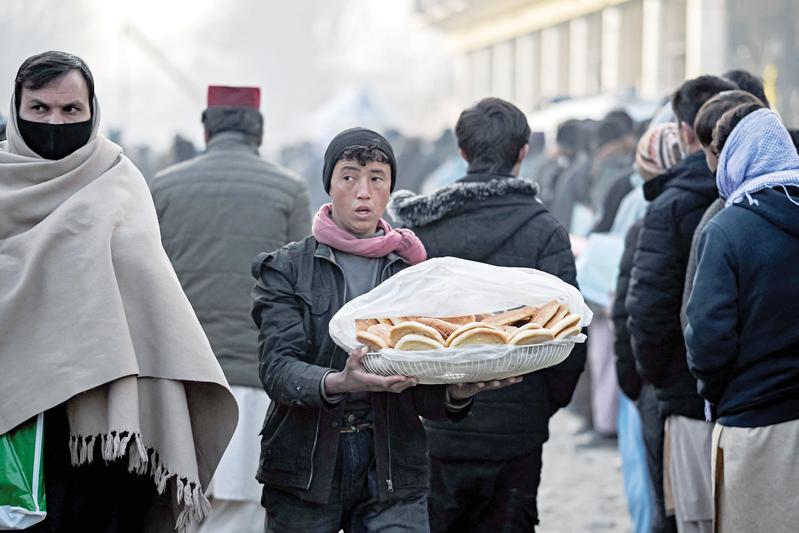 A vendor sells bread as people queue to enter the passport office at a checkpoint in Kabul on Dec 19. Islamic countries have vowed to help Afghanistan stave off an economic and humanitarian disaster. (MOHD RASFAN / AFP)
A vendor sells bread as people queue to enter the passport office at a checkpoint in Kabul on Dec 19. Islamic countries have vowed to help Afghanistan stave off an economic and humanitarian disaster. (MOHD RASFAN / AFP)
The Organization of Islamic Cooperation, or OIC, has issued a global appeal for the Afghan people, backed up by the announcement of a humanitarian trust fund for this purpose.
Representatives of countries across the Muslim world, meeting in the Pakistani capital Islamabad on Dec 19, said efforts must be made to prevent an economic collapse in Afghanistan, and that the country must have access restored to overseas assets that have been frozen.
Pakistani Prime Minister Imran Khan, in a keynote speech, said: “Unless action is taken immediately, Afghanistan is heading for chaos.”
Khan made the call to action at the 17th extraordinary session of the OIC’s Council of Foreign Ministers.
The world should not abandon Afghanistan in its hour of need, he said, warning that if the world does not come to the war-torn country’s aid, the crisis will only get worse.
“Even before Aug 15, half of the population (in Afghanistan) was below the poverty line ... 75 percent of the budget was supported by foreign aid,” said Khan, referring to the takeover of the country on that date by the Taliban.
“After Aug 15, if the foreign aid dries up, foreign reserves get frozen, banking system freezes, any country is going to collapse, let alone Afghanistan which has suffered conflicts for years.”
The OIC is the second-largest global organization after the United Nations, with 57 member states.
During the session, the Islamic countries made a pledge for a trust fund for Afghanistan, an initiative announced by Pakistan’s Foreign Minister Shah Mahmood Qureshi.
The trust fund will be established under the aegis of the Islamic Development Bank, with the aim of channeling humanitarian aid to Afghanistan in coordination with other groups.
OIC Secretary-General Hissein Brahim Taha, of Chad, said in Islamabad that the organization has become essential in the face of mounting humanitarian challenges in Afghanistan.
Salman Bashir, a former Pakistani ambassador to China, said the Islamabad meeting marks “a grand gesture of solidarity with the Afghan people”.
Amir Khan Muttaqi, acting Afghan foreign minister, said the Taliban government had restored peace and security in the country and done much to address demands for more inclusiveness with respect for human rights, including the rights of women.
Iran’s Foreign Minister Hossein Amir Abdollahian also participated in the session.
Qureshi, the Pakistani foreign minister, also suggested that efforts be made to mobilize investment inflows for Afghanistan, and the formation of a focus group to find solutions to its financial challenges.
He called for help to build up the capacity of the Afghan government to fight terrorism and the drug trade. Qureshi spoke of the concerns voiced by agencies for a worsening humanitarian crisis, and said the world should come together to alleviate food shortages in Afghanistan.
Amir Khan Muttaqi told the session that the freezing of Afghanistan’s assets “is a clear violation of the human rights of Afghans”.
This month, the UN Human Rights Council said the people of Afghanistan are facing a profound humanitarian crisis that threatens the most basic of human rights.
Nada Al-Nashif, UN deputy high commissioner for human rights, said the hardships in the battered country are compounded by the impact of Western sanctions and the freezing of state assets.
Xinhua and Reuters contributed to this story.


